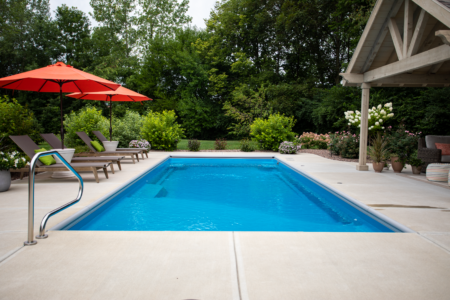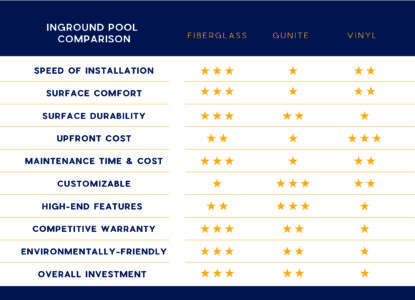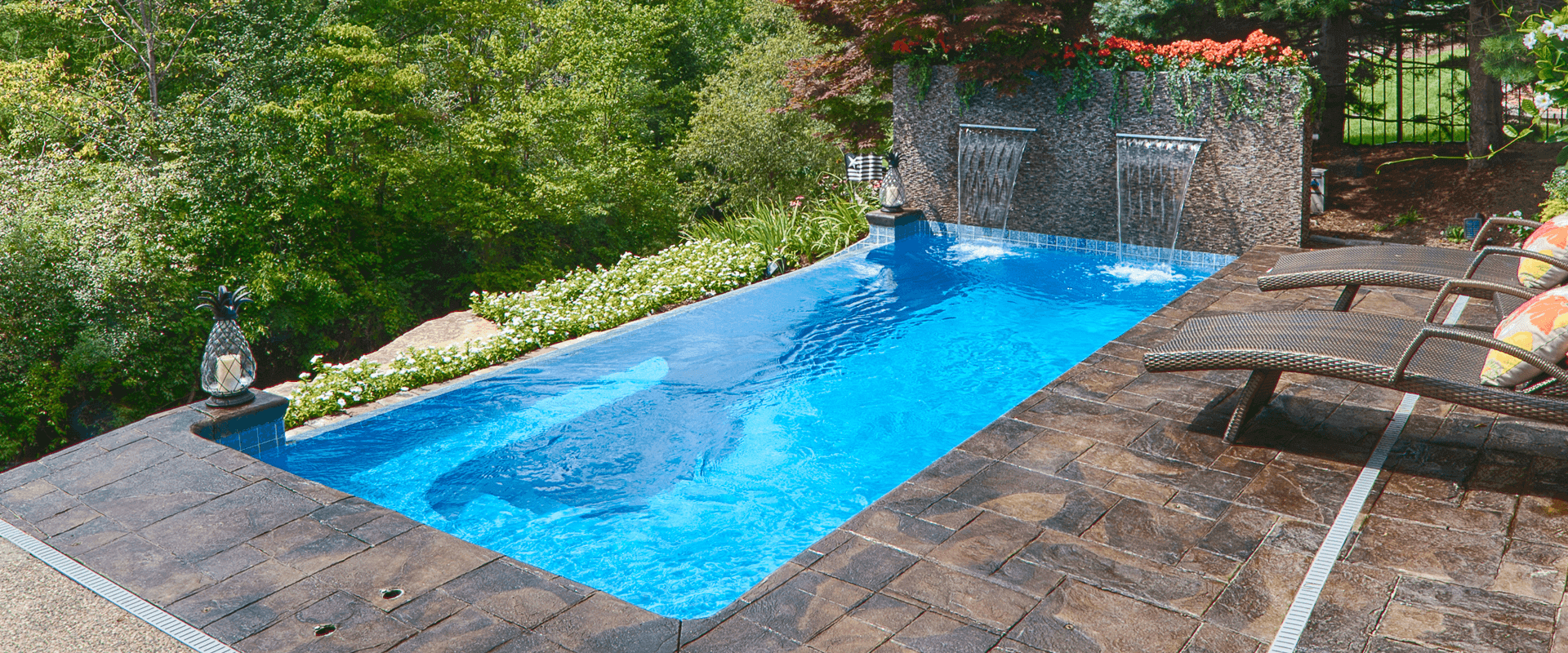877-929-7665
How Much Does a 12×24 Inground Pool Cost?
One of the first considerations for purchasing an inground pool is size. Pool size affects the functionality and enjoyment of your outdoor living area as you consider landscaping, deck areas, and other pool-side amenities. Many homeowners look for smaller pools because they have a small yard or simply want more room for other activities. A small pool, less than 400 square feet, fits in most yards and leaves space for cooking, dining, and relaxation. So naturally, a popular question we answer is, “How much does a 12 x 24 inground pool cost?” Let’s explore how you can get a ballpark estimate of the price of an inground pool.
Understanding How Builders Estimate Inground Pools Prices
One of the first things a homeowner should know is that builders estimate each pool differently depending on the material type. The difference in measurement units—square feet for vinyl and gunite pools versus linear feet for fiberglass pools—arises mainly from how these pool types are constructed and estimated.
Vinyl and Gunite Pools (Square Foot):
- Construction Approach: Vinyl and gunite pools are custom-built on-site, allowing for virtually any shape and size.
- Square Foot Estimation: Since these pools are often irregularly shaped, the total surface area needs to be considered for material costs (like liner for vinyl or concrete for gunite) and construction complexity.
- Pricing Factors: Square footage directly relates to how much material is needed, how much labor is required, and the complexity of features like steps or tanning ledges.
Fiberglass Pools (Linear Foot):
- Construction Approach: Fiberglass pools are prefabricated molds manufactured in standardized shapes and sizes and then transported to the site.
- Linear Foot Estimation: Pricing by the linear foot is often used because the cost is heavily influenced by the pool’s perimeter, impacting the ease of installation, shipping, and how it fits within a designated space.
- Pricing Factors: Linear foot pricing considers the pool’s perimeter, which impacts the excavation, backfilling, and coping needed. This measurement is simpler because the pools come in fixed, predefined shapes, making surface area less variable than vinyl and gunite pools.
Using these units helps contractors provide more accurate estimates based on the specific characteristics of each pool type, aligning with how the materials and construction work are distributed and priced.
Average Pricing for a 12 x 24 Pool by Pool Type
With a better understanding of how pool builders price pools, let’s show the formula in action with some inground pool cost estimates.
12 x 24 Vinyl Pool Cost: $35,424
According to HomeGuide’s 2024 pricing guide, vinyl liner pools are at the lower end of the inground pool prices, averaging $123 per square foot.
12 x 24 Fiberglass Pool Cost: $48K
If you are interested in a fiberglass inground pool, we recommend estimating the initial cost at $2,000 per linear foot So, a 12 x 24 inground fiberglass pool’s cost estimate is: 24′ x $2,000 = $48,200.
12 x 24 Gunite Pool Cost: $50,400
According to the renovation calculator site, renotag, gunite pools average $175 per square foot, putting a 12×24 gunite pool around $50,400.
You might wonder why fiberglass costs less than gunite. Gunite pools are built from the ground up, whereas fiberglass pools are built off-site in a controlled manufacturing setting. Pool manufacturers make fiberglass pools with molds that limit their length so they can be transported safely and securely from the manufacturer to your home. However, that doesn’t mean you can’t go big with fiberglass if you want to.
Other Cost Factors to Consider
Of course, these numbers don’t account for every scenario. For example, a Texas Hill Country pool cost might be calculated differently from a similar Kansas City suburb design due to soil makeup, labor costs, supply and demand, and a host of other factors.
A checklist of other items you may consider in developing your cost picture includes:
- Driveway Repair
 Association Fees or Permits
Association Fees or Permits- Crane Rental
- Landscaping
- Retaining Walls
- Pool Heater
- Automatic Vacuum Systems
- Dirt Hauling
- Slides or Waterfalls
- Saltwater Option
- Generator
- Specialty Tile
- Led Lights
- Bubblers or Deck Jets
- Spas
Which Pool Type is Best for You?
We think highly of fiberglass pools, but we think it’s good to be fully informed. There are situations where gunite or vinyl may be the best fit. For example, gunite is a good choice in areas of the country that are not subject to freeze-thaw cycles (because of cracking issues). They also may be your first choice if you have ample installation time and want a custom shape or extra-large size. Vinyl may be your choice if you want the lowest upfront cost possible. There are other factors to consider, which we certainly lay out in detail in our comparison ebook, but here’s a quick reference to some of the pros and cons of each type of inground pool.
None of the pool types has three stars across the board in our comparison chart. It’s a question of what’s most important to you. Two of the biggest surprises for some buyers are fiberglass’s high marks in “durability” and “surface comfort and safety.” Fiberglass looks so shiny that some mistakenly link it to plastic and worry that it will be brittle and slippery. The fact is that multilayered fiberglass is incredibly durable, and the attractive gelcoat provides a comfortable, non-snag/non-skid surface!

More Resources for Your Search
As you evaluate your choice of the different inground pool options, you can use tools like the Thursday Pools free pool cost calculator, print out our pool cost checklist, and consult a dealer. Every installation is unique, and a dealer can be a great resource in highlighting cost factors specific to your locale, such as site preparation, access issues, fencing, restoration, dirt hauling, or electrical work. While an inground pool can be a considerable investment, it can also be a place for making priceless memories.
